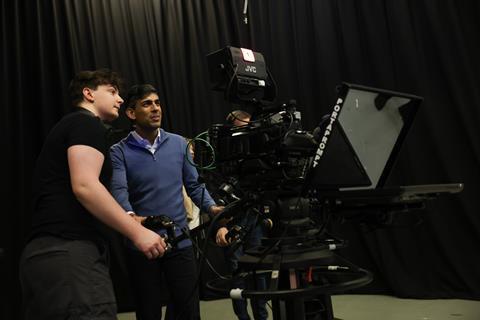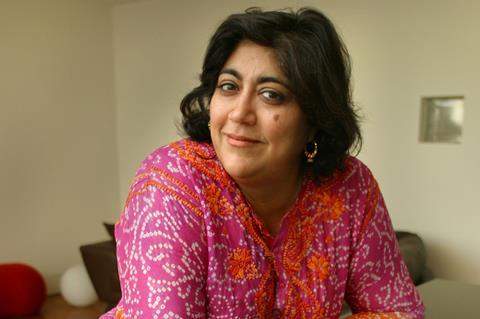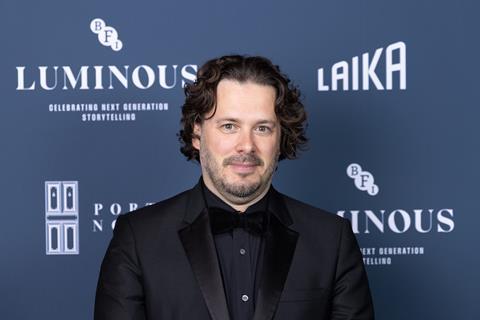
Prime minister Rishi Sunak has positioned himself as one of the biggest cheerleaders for the UK film industry.
A groundbreaking Independent Film Tax Credit (IFTC) for UK films budgeted under £15m was part of a package of initiatives unveiled by Sunak’s government on March 6, including 40% relief on business rates for English studios and a 5% uplift for visual effects.
They follow the government’s pledge in 2023 to grow the creative industries by a further £50bn (in GVA) and support an additional one million jobs by 2030.
While all financial interventions and support are important and significant, the long fought-for IFTC has been particularly welcomed by the UK industry for providing support to an independent film sector widely regarded to be in crisis.
From Sunderland in the north-east of England, where Sunak was visiting to talk up government investment in the city’s Crown Works Studios, the prime minister explained to Screen why he believes a thriving indie film industry is important for the UK economy. He talked about how the passionate testimonies from filmmakers such as Christopher Nolan, Edgar Wright and Barbara Broccoli played a role in securing the IFTC and he also tells us who would play him in the film of his life.
Why did you decide to throw your personal support behind the indie film tax credit?
It’s a slightly long answer as I’ll give you the full context. The first thing is, I’ve always been a passionate believer and supporter in our creative industries overall. And that’s because I think it’s something that we are world leading at, that we should just be very proud of. And it’s obviously important for our economy and jobs in a way that people don’t always appreciate. It allows us to project our values and tell our stories all around the world. But probably more importantly than any of that it’s just really enriching for all our lives and our local communities.
Particularly at a time when, over the last few months, I’ve talked a little bit about the rise of division that we’ve seen. Culture has an amazing way of unifying us and bringing us together, whether that’s everyone who goes to their local pantomime as we do every Christmas in my tiny little theatre in North Yorkshire, or goes to see a big blockbuster movie about Barbie or Oppenheimer.
So that’s my view of the world before this independent film story which really started because we host quite regular cultural receptions at Number 10 [Downing Street]. People come in regularly so I get a sense of what’s going on in the industry. And in particular, we had one at the end of last year to celebrate the film industry, and 25 years of Love, Actually.
Lots of the people there were talking to me about what was going on in the independent sector. And, essentially, if you look, we’ve had a really good recovery from the pandemic, partly because of things like the Film [and TV Production] Restart scheme that I set up as chancellor [Sunak was chancellor of the exchequer from 2020 to 2022] and the Cultural Recovery Fund. And if you look at the top 10 UK box office hits last year, I think half of them – around five – were predominantly made in the UK. But where there’s an issue is independent British films. Their share of the box office is about 4% which is one of the lowest on record. And because of the way that the industry is changing with streaming and the money, there’s clearly a risk that we’re not nurturing the next generation.
It felt to me, like in the pandemic, when people were talking to me about the Film [and TV Production] Restart scheme and the need for it, it felt like that. And so I spent time talking to people in the industry. And what I was struck by was, even the big producers and directors, whether that’s Christopher Nolan, or Barbara Broccoli, or Tim [Bevan] and Eric [Fellner] from Working Title, even the people who are now spending most of their time on very large productions, were saying, ‘This is the most important thing that you need to do’, as well as obviously great independent filmmakers like Edgar Wright and others.

And it’s because this is all interconnected. Ultimately we won’t have the future Christopher Nolans if we don’t have a vibrant, independent film sector. Part of our attraction to the world’s filmmakers who come and make their films here, which is great for the country, is because they know that we’ve got the most talented people involved in production. To make sure that we foster that next generation of talent, having a vibrant independent sector is really important.
That’s how it all came together. And you know, it was speaking to not just US executives, but everyone involved in the UK. We managed to put this together and I’m really pleased with the response. Hopefully, people in time will look back on it as a really important moment for the sector and for the industry, and safeguarding its future, essentially.
At a time when government money is tight, how did you make the financial case to the Treasury?
It’s important to realise the economic contribution of the creative industries to our country. I often find that people don’t appreciate it. They’ll get the artistic side of it, the storytelling, but people have to remember how many jobs and how many billions of pounds this industry accounts for. And it’s one of our blockbuster global industries.That’s why it’s important that the government understands where it can make contributions with incentives or investment that will provide a platform for private-sector growth.
And that’s what we’ve done with the tax credit, not just for the independent film, but [with] the studio business rate relief, which is really important. This investment in Sunderland is a good example of a public-private partnership, which is going to be transformational for the north-east, and [provide] a lot more studio space, which we need. And with the VFX tax credit. And the rest of the ecosystem, the [permanent extension of] the theatre tax credit and investment in the National Theatre.
All of those, put them together, show that we just want to make sure every part of the creative industry ecosystem is strong. We’re nurturing the next generation of talent, we’re attracting investment into the country, and ultimately that will be good for our economy, long term.
And how much has the IFTC been budgeted to cost the Treasury in the first year?

So those numbers are all in the budget document. It’s 10s of millions of pounds in the first year. [According to Treasury figures, the estimates are: 2025/2026 £60m; 2026/2027 £65m; 2027/2028 £80m; and 2028/2029 £80m.] If you take it together, all the different things that we’ve done in the budget over the kind of five-year period they are forecasting, there’s about a billion pounds worth of support over five years through the different tax credits, different investments [in] theatres, galleries, National Theatre, business rates. Because it’s important we look at it and take it together.
That is going to benefit a multi-billion pound industry that employs hundreds of thousands of people across the country, and is supporting something that will be truly world class. I think the response, both internationally and domestically, tells you this is the right thing to do and it will pay dividends in the future.
Is there a plan to support the freelancers who comprise a very high proportion of the film and TV workforce? They have suffered a devastating loss of income following the US strikes last year, and they need urgent support now to ensure this independent sector can thrive through having skilled people to work on the films.
Yes, I know it’s been a really tough time for many people because of the strikes in particular. But I think now, when I was talking to people, the things that we can do to make a difference are essentially to make sure the sector they are all going to work in is vibrant, and we’re getting the investment in, and productions are being made here. To make sure that they have jobs and sets and crews that they can join.
The second thing is, that [for] those people who are self employed, in this budget [announced on March 6] and in the autumn statement, that tax cut is worth hundreds and hundreds of pounds for those people when they’re in work [Class 4 National Insurance Contributions were cut from 8% to 6%]. We’ve had two budgets or fiscal events over the last few months, both of them have cut taxes for those people in self employment. Because self employment isn’t always easy, right? Especially freelancers, you don’t quite know where your next gig is going come from. But we’ve cut taxes for them, as well as for everyone in employment, that’s worth pointing out.
We also want to make sure that the next generation is getting the support they need. The Brit School in Bradford that we’re setting up and the work we’re doing on flexi apprenticeships which started [when I was] chancellor. Lots of young people want to do an apprenticeship to get into the industry. But as you know, because they’re freelancers and they’re going from job to job, it doesn’t quite fit with the traditional apprenticeship model where you’re in one place for a fixed amount of time.
So I helped set up, with the Creative Industries Council, a flexi apprenticeship model, which will deal with that, and then we need to figure out how we scale that up so lots of more new young freelancers can come into the industry via an apprenticeship.
There were so many receptions, round tables and meetings with the film industry in the past few months. Is there anybody whose representation to you really made the difference?
It was not one person, it was across the board. What I was surprised by was the people who are now mostly involved in producing big blockbuster movies, whether it’s Christopher Nolan and his wife, Emma Thomas, Barbara Broccoli, Tim Bevan, Eric Fellner from Working Title. On the one hand, I’m hearing from all of them, as well as big US film executives, who are excited about UK independent film and backing it.
And then obviously, you’ve got people from the independent sector. Edgar Wright came into one of these roundtables and was incredibly compelling about the world of independent film and how it is an incubation for the next generation of British talent, and talking about his story.
All of that came together for me, as well as just being out and about meeting young people. I’m in Sunderland today and I was at Pinewood at the start of the year talking to all the apprentices there, all the students. I was at NFTS [National Film and Television School], I’ve been at the London Screen Academy last year a couple of times.
And it’s actually talking to all of those youngsters about their aspirations, and dreams for their futures, that really hit home to me the importance of making sure that they have a place to start their career, to realise their long-term ambitions. Because we’ve got so many talented young people in our country, across the board. It’s not just about actors and directors, it’s about people. As you know, there are hundreds of people involved in putting these things together. And it’s meeting all these youngsters and seeing how excited they were about their future and everything they want to achieve, and realising I want them to be able to make their dreams come to reality.
And that means having a vibrant independent film sector for them to get their first start and their second start and build their careers. So they should hopefully end up being the Emma Thomas or the Christopher Nolan in the years to come.
Do your children like going to the cinema?
They do! I don’t get to go as much with them as you would expect but we did get to Barbie last year which was very fun. And then I made it to Oppenheimer separately with my wife and we all went to The Witches at the National Theatre together.
Finally, one of the hard-hitting questions we ask on Screen is, who would play you in the film of your life and who would direct it?
Neither of them are my age but growing up, I remember watching Sanjeev Bhaskar, who was so seminal in [TV series] Goodness Gracious Me as an Indian actor breaking through. More recently, and he’s much younger than me and much better looking, is Dev Patel.
On the directing side, it’s going to have to be a toss up between Gurinder Chadha, who I think is brilliant and I had opportunity to meet her a couple of times. She’s so full of life and interesting, and a ground-breaking director. Or Matthew Vaughn, who I am a big fan of. I like the whole look of Kingsman. If he could turn me into that, then why not?

























No comments yet